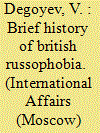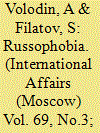|
|
|
Sort Order |
|
|
|
Items / Page
|
|
|
|
|
|
|
| Srl | Item |
| 1 |
ID:
188495


|
|
|
|
|
| Summary/Abstract |
NEVER BEFORE has the term "Russophobia" been as widely and routinely used as it is today. Emerging in Europe in the 1830s, it denoted a phenomenon much older than itself. Strictly speaking, there was and is nothing phenomenal about this phenomenon in its traditional understanding as a special dislike for Russia and Russians. It just so happens that there is no love between states and peoples because this is unnatural for them and has no grounds. To compete, fight, ally, cooperate, trade, borrow, envy, despise, hate - anything but to love.
|
|
|
|
|
|
|
|
|
|
|
|
|
|
|
|
| 2 |
ID:
060208


|
|
|
|
|
| Publication |
London, routledgeCurzon, 2005.
|
| Description |
x, 293p.hbk
|
| Series |
East European Studies
|
| Standard Number |
0415333202
|
|
|
|
|
|
|
|
|
|
|
|
Copies: C:1/I:0,R:0,Q:0
Circulation
| Accession# | Call# | Current Location | Status | Policy | Location |
| 049432 | 947.0854/HOR 049432 | Main | On Shelf | General | |
|
|
|
|
| 3 |
ID:
167744


|
|
|
|
|
| Summary/Abstract |
THE MONTH OF MAY and its fireworks are now behind us. The country and the world celebrated Victory Day, which is a holiday of war veterans, home front workers, and all the people of Russia and other victorious nations. There was a grand parade on Red Square and a wreath-laying ceremony at the tomb of the Unknown Soldier. The march of the Immortal Regiment - a civil initiative that has acquired a truly global dimension - took place again not only in Russia, but in many other countries as well, with the participation of hundreds of thousands of Russians, our compatriots abroad and citizens of other countries - all people who cherish the memory of Victory and the memory of those who worked to bring it closer.
|
|
|
|
|
|
|
|
|
|
|
|
|
|
|
|
| 4 |
ID:
192442


|
|
|
|
|
| Summary/Abstract |
THE confrontation in opinion journalism today between Russia and countries of the collective West is commonly called hybrid warfare - in particular, on the grounds that provocations, the falsification of facts, and the heightening of tensions are taking place in the disparate realms of politics, economics, and culture. At the forefront of the struggle is the information space, which promptly and sometimes sharply reacts to any fluctuations in the political situation, focusing attention on a certain problematic issue. One such topic that has become a significant label for current political events is genocide.
|
|
|
|
|
|
|
|
|
|
|
|
|
|
|
|
| 5 |
ID:
191029


|
|
|
|
|
| Summary/Abstract |
FROM an analytical perspective, Russophobia is not all that different from other social phenomena. Like other forms of xenophobia, Russophobia operates on two levels: public fears and state policies. The boundaries between these two levels are often relative, fluid, and subject to change.
The authors suggest that Russophobia is a significant yet specific form of xenophobia, which represents a rejection of something foreign, unfamiliar, and therefore potentially dangerous to the established way of life in a given society. This perceived threat may be viewed as endangering the very existence of the established order of things. As historical experience has shown, xenophobia can arise from a sense of inferiority (either genetically inherited or acquired), stem from a "failed great power" complex that places the blame on a disliked neighboring state (or a perennial geopolitical rival), or emerge from the constant fear of the territorial size and military potential of the "demonized" power, etc...
|
|
|
|
|
|
|
|
|
|
|
|
|
|
|
|
| 6 |
ID:
185051


|
|
|
|
|
| Summary/Abstract |
MODERN Russian historians and journalists have been paying a great deal of attention to the Ukrainian national movement in the former Soviet Union. A lot of research has been done of the emergence of Ukrainian statehood; generous territorial transfers to the Ukrainian Soviet Socialist Republic from the Russian Soviet Federative Socialist Republic (RSFSR) and East European countries; the Ukrainification of former Malorossiya [Little Russia]; and the activities of Ukrainian radical nationalists before, during, and after World War II. Various aspects of the revival of nationalism in Ukraine in the 1990s are also on historians' radar.
|
|
|
|
|
|
|
|
|
|
|
|
|
|
|
|
| 7 |
ID:
161046


|
|
|
|
|
| Summary/Abstract |
This article is a study of the evolution of the Ukrainian national and political identity in the context of the most important aspects of its formation, singled out by the author. The author’s methods are based on the principle of historicism. He analyzes the formation and development of political practices and the political regime in Ukraine in the 20th-21st centuries, and compares peculiarities of the ethnic, cultural and political development of Ukraine with that of Russia and other countries in Eastern Europe. Prospects for the development of the political situation in Ukraine are discussed through the prism of the geopolitical paradigm. The author points out that during the Soviet period there were factors that worked for the separation of Ukrainians from Russians and those that worked against it. In the post-Soviet period, under the influence of growing ethnic and civic nationalism, globalism and some peculiarities of Ukrainian political culture separatist tendencies prevailed. The current conflict in Donbass has entered into a smoldering phase, which is most advantageous to the Ukrainian authorities. He describes as unlikely the possibility of major changes in the Ukrainian regime. The more probable scenario, in his opinion, is inertial.
|
|
|
|
|
|
|
|
|
|
|
|
|
|
|
|
| 8 |
ID:
189155


|
|
|
|
|
| Summary/Abstract |
IN THE 2010s, Russia attempted to revitalize the collective memory of the Great Patriotic War to fill the ideological vacuum created in the former Soviet Union by the latter's breakup in 1991. With support from Russia's presidential administration, events were held in various Russian cities from 2010 to around 2020 to mark the victory in the war. Those events brought together veterans and public figures from various Russian regions and other former Soviet republics.
|
|
|
|
|
|
|
|
|
|
|
|
|
|
|
|
|
|
|
|
|